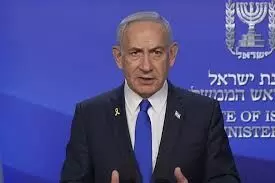Two More Top Iranian Generals Killed, Nuclear Site Damaged as Israel Launches Major Strikes

Iran has confirmed that two of its top generals were killed in fresh Israeli airstrikes early Saturday, marking a sharp escalation in hostilities between the Middle East’s two main rivals. The announcement came after waves of Iranian missiles and rockets struck Tel Aviv, with explosions also reported in Jerusalem and other parts of Israel.
The latest round of Israeli airstrikes followed what officials described as the country's largest-ever military offensive against Iran. The operation, launched on Friday, targeted key Iranian nuclear sites, killed several top military commanders, and damaged critical infrastructure. On Saturday, the Israeli military launched a third round of strikes on Tehran, with multiple explosions heard across the capital.
Among those killed were General Gholamreza Mehrabi, deputy head of intelligence of Iran’s armed forces general staff, and General Mehdi Rabbani, deputy head of operations, according to Iranian state media. Iran also confirmed that its Fordow nuclear facility suffered limited damage, but officials insisted that much of the sensitive equipment had already been moved out and there were no radiation risks.
“There has been limited damage to some areas at the Fordow enrichment site,” said Behrouz Kamalvandi, spokesperson for Iran’s Atomic Energy Organization, as quoted by The Times of Israel. “There are no contamination concerns.”
Key Developments:
* Iran's missile barrage, dubbed "Operation True Promise", killed at least three people in Israel and injured 34 others, managing to breach the country’s Iron Dome missile defense system.
* In retaliation, Israel launched "Operation Rising Lion", which continued into Saturday. The strikes have reportedly killed at least 78 people—most of them civilians—and injured over 320 in Iran.
* Israeli warplanes and drones hit multiple sites in Tehran, including areas near the Mehrabad airport, which is located close to key government and military installations. Flames and explosions were reported in the area.
* Israeli Prime Minister Benjamin Netanyahu declared that Israel’s military campaign was far from over. “More is on the way,” he warned, stating that the goal was to dismantle Iran’s nuclear program and eliminate what he called the “murderous Islamic regime.”
* Iran’s supreme leader, Ayatollah Ali Khamenei, had earlier vowed retaliation, stating in a televised address: “The armed forces of the Islamic Republic will inflict heavy blows upon this malevolent enemy,” referring to Israel. He warned that Israel would “face ruin” as a result of its actions.
* The U.S., while not directly involved in the conflict, has deployed ground-based missile defense systems in the region to intercept Iranian rockets. Former President Donald Trump commented, “We knew everything,” and urged Iran to negotiate a new nuclear deal, warning of “even more brutal” Israeli attacks if diplomacy fails.
* Iran, however, dismissed the idea of renewed talks with Washington, calling any dialogue over its nuclear program "meaningless" in light of the recent Israeli assault.
* The Israeli military has reportedly been planning the operation since November 2024, shortly after the killing of Hezbollah leader Hassan Nasrallah. Israel is said to have used warplanes and drones smuggled into Iran to strike high-value targets.
Among the most high-profile casualties of the Israeli airstrikes were:
* General Mohammad Bagheri, chief of staff of Iran’s armed forces
* General Hossein Salami, head of the Islamic Revolutionary Guard Corps (IRGC)
* General Amir Ali Hajizadeh, head of the IRGC’s missile program
UN Secretary-General António Guterres has called for both nations to immediately cease hostilities and return to diplomacy. However, Israel’s envoy to the UN insisted the military campaign will continue until all "threats in Iran" are neutralized.
In a diplomatic outreach, Prime Minister Netanyahu spoke with Indian Prime Minister Narendra Modi, among other world leaders, to garner international support. India has expressed "deep concern" over the conflict and urged both sides to avoid further escalation.
